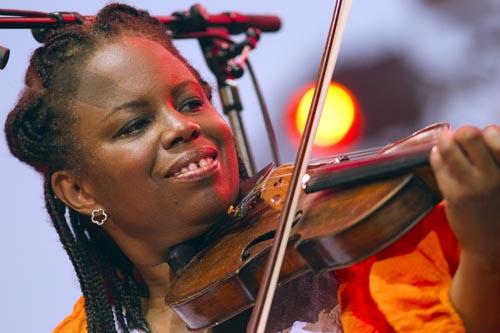Honoring Family and Roots

Regina Carter had a way of making herself known even as a young child. When she purposefully played the wrong ending note at piano concert, the exasperated teacher suggested she switch to violin. She did, indeed, learn the violin, as well as piano and oboe. She also took lessons in tap dancing, ballet and choir singing, and played in a high school band, Brainstorm. Before graduating, she had taken master classes from acclaimed violinists Yitzhak Perlman and Yehudi Menuhin and shaken the hand of the great Ella Fitzgerald.
But, despite that auspicious beginning, it took Carter awhile to find her own musical foothold. She spent two years in Germany as a nanny, teaching violin on a U.S. military base, and then taught violin in Detroit. Musical opportunity presented itself when she was invited to join an all-female jazz quintet in 1987. In 1991, a relatively unknown Carter moved to New York was soon playing with such talent as Aretha Franklin, Lauryn Hill, Billy Joel and Dolly Parton. Her star began to ascend.
Carter, who was born in 1966 in Detroit, was very close to her family and many of the albums she went on to record mirror those deep feelings of love and connection. “Something for Grace,” a tribute to her mother, was released in 1997 and her 2006 album, “I’ll Be Seeing you: Sentimental Journey” celebrated her mother’s favorite early jazz standards. Her most recent album, Southern Comfort, was inspired by her grandfather, an Alabama coal miner. Carter brilliantly tackles Cajun fiddle music, early gospel and coal miners’ work songs in a nod to that era in history and it’s hard-working people.
In 2006, Carter was awarded a prestigious MacArthur Program Fellows grant — $500,000 to be distributed over five years. In its decision, the MacArthur Committee called the musician “a master of improvisational jazz violin,” and said Carter has “crafted a signature voice and style.”
The Committee concluded, “Through artistry with an instrument that has been defined predominantly by the classical tradition, Carter is pioneering new possibilities for the violin and for jazz.”
***
March is National Women’s History Month! We’ll be sharing stories about some of the most accomplished women in jazz, both nationally and locally. We hope you enjoy this tribute to the women of jazz.
9(MDA3NDU1Nzc2MDEzMDUxMzY3MzAwNWEzYQ004))
Become a Member
Join the growing family of people who believe that music is essential to our community. Your donation supports the work we do, the programs you count on, and the events you enjoy.
Download the App
Download KUVO's FREE app today! The KUVO Public Radio App allows you to take KUVO's music and news with you anywhere, anytime!
